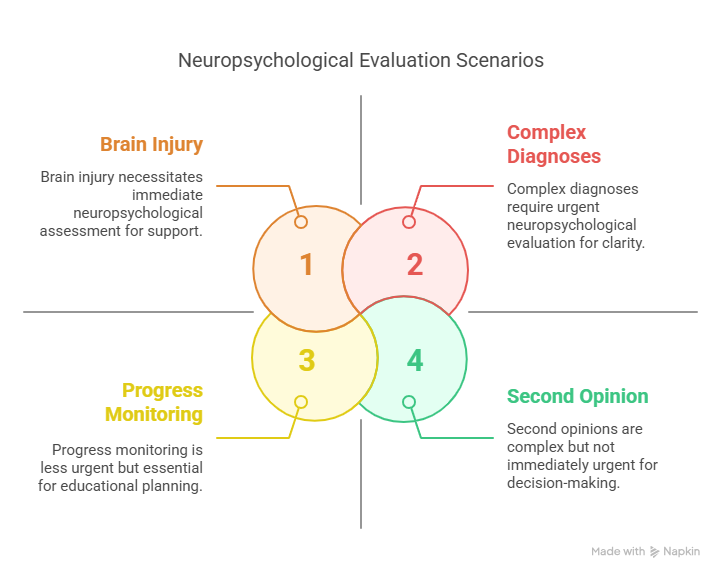Article by Lindsay Petouvis, Licensed Psychologist
Table of Contents
ToggleNavigating the process of identifying and supporting students with learning or developmental challenges can be complex. Public schools have systems in place for evaluating students for special education services, but there are instances when a more comprehensive or specific neuropsychological evaluation may be needed. While both types of evaluation processes aim to understand a child’s needs, the type of information collected, the lens of interpretation, and the purpose of the assessments may be different. Understanding when a neuropsychological evaluation is needed instead of—or in addition to—a public school evaluation is essential for ensuring that students receive the most accurate diagnosis and appropriate interventions, both for school-related purposes and identifying needs outside of the school setting.
What is a Neuropsychological Evaluation?
A neuropsychological evaluation is a comprehensive assessment that examines a child’s holistic functioning. The purpose is not solely based on what is educationally impacting the child, but rather how the child is functioning in all environmental domains. It focuses on understanding how a child’s brain is processing information across settings. A neuropsychologist administers a battery of standardized tests, reviews the child’s records, interviews the family, attains school input from teachers, and requests rating scales to be completed by people in the child’s life regarding their behavior and presentation.
The following areas are assessed:
- Cognition
- Language
- Motor Functioning
- Attention
- Executive Functioning
- Memory & Learning
- Developmental Functioning
- Academic skills
- Social, emotional, & behavioral functioning
The results of a neuropsychological evaluation offer a deeper understanding of a student’s brain functioning and how it connects to their academic struggles, providing valuable insight that may not be apparent from a standard educational assessment alone. Additionally, schools oftentimes do not diagnose a child with a condition, but rather identify an area of educationally-related disability. A neuropsychological evaluation may include clinical diagnoses that are not part of an educational lens.
Public School Evaluations for Special Education Eligibility
In contrast, public school evaluations for special education eligibility are generally conducted to determine whether a student meets the criteria for services under the Individuals with Disabilities Education Act (IDEA). These evaluations are typically conducted by a multidisciplinary team that may include a school psychologist, special education teacher, learning consultant, speech/language therapist, and/or other professionals.
The process usually begins with the identification of concerns, followed by assessments in areas such as:
- Academic achievement
- Behavioral functioning
- Cognitive testing
- Speech and language
- Motor functioning
Schools may also contract outside professionals to evaluate specific areas of concern if they do not have staff to appropriately diagnose in a particular area of suspected disability. For example, a neurologist, psychiatrist, developmental pediatrician, teacher of the blind, and/or a neuropsychologist may be contracted to contribute to the school-based evaluation process.
Public school evaluations are generally more focused on identifying a specific disability that impacts learning (such as autism, ADHD, or a learning disability) and determining whether the child requires special education services in order to make meaningful educational progress.

When Is a Neuropsychological Evaluation Needed?
While public school evaluations are essential for identifying students who need special education services, there are several scenarios in which a neuropsychological evaluation may provide additional value or be more appropriate, which are described below.
1. Complex or Unclear Diagnoses
When a child exhibits learning or behavioral issues that are not easily explained by a standard school-based assessments, a neuropsychological evaluation can offer clarity. This includes cases where a child may have multiple co-occurring conditions, such as ADHD and a learning disability, or when there is a question about whether a child has a brain-based condition, like dyslexia or autism spectrum disorder (ASD).
For example, if a student is functionally struggling in school but tests average in intelligence and academic skills, a neuropsychological evaluation may reveal difficulties with executive functioning, processing speed, or memory, which are not always detected with a school-based evaluation.
2. Brain Injury, Neurodevelopmental Disorders, & Significant Health Changes
Students with health issues, such as certain cancers, genetic conditions, brain injuries, or mental illnesses that develop later in childhood may need a thorough understanding of their neurocognitive strengths and weaknesses in comparison to their baseline functioning to determine future supports.
3. Second Opinion
Sometimes parents and schools decide they need a third party opinion to assist with the diagnostic and/or program development process, including a neuropsychological evaluation.
4. Progress Monitoring
After an initial diagnosis, parents and schools look to measure progress with objective assessments. When a student has not made reasonable educational and/or developmental progress, reevaluation is often conducted by a third party outside of school staff.
Progress monitoring is also completed privately when parents are seeking an unbiased opinion regarding if their child is prepared for a step down in services or declassification from special education.
Conclusion
Public school evaluations for special education eligibility are an essential part of ensuring students receive the support they need, however, there are circumstances when a comprehensive neuropsychological evaluation is necessary. A neuropsychological evaluation is especially important in complex cases where there are co-occurring conditions, educational progress has been limited, disagreement about programming leads to the need of an independent evaluation, and/or when a student has certain health conditions impacting neurocognitive development.
Ultimately, the decision to pursue a neuropsychological evaluation should be made in consultation with educators, clinicians, and specialists. It can often lead to more precise diagnoses and drive more specific interventions. By ensuring that a child’s unique needs are fully understood, parents, teachers, and clinicians can collaborate to provide appropriate educational services and optimize their quality of life moving forward.

Lindsay Petouvis, Psy.D., ABPdN, ABSNP
NJ/NY Licensed Psychologist (NJ#: 35S100541300)
Dually Board Certified
Dr. Lindsay Petouvis is a pediatric neuropsychologist and the founding owner of Mindspring Development Services in Waldwick, New Jersey. She evaluates youths to identify their strengths and weaknesses, determines if disabilities are present, and provides holistic recommendations for their development. She particularly specializes in evaluating people for dyslexia, dysgraphia, dyscalculia, ADHD, Autism, and co-occurring behavioral/psychiatric conditions. With 17+ years of experience working with children in a variety of settings, Dr. Petouvis collaborates with families, students, schools, and service providers to develop support strategies for each young person’s developmental journey.


